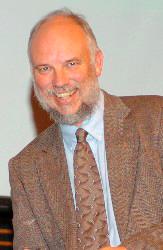Changes made in Natural Resources administration
From the statue of Janet Quinney in front of the Natural Resources Building, to the USU Charter Credit Union ATMs around campus, Nat Frazer has left his mark at USU as the dean of the College of Natural Resources.
Frazer will voluntarily step down from the position Dec. 31. Chris Luecke, the current head of the watershed sciences department, will take over as the interim dean for the following 18 months while administrators conduct an extensive external search for a permanent dean to lead the college.
“President Albrecht is very excited and confident about the future of the College of Natural Resources,” Provost Ray Coward said. “Given the decision of Dean Frazer to step down from his administrative duties and return to the faculty, we decided that it was prudent to pause for a period of time and be sure that we have widespread consensus about the future path that will move the university and the college to greater heights of achievement.”
Doing an external search enables the administration to choose from a wide pool of highly qualified individuals, Frazer said.
“An external search does not preclude the possibility that the top candidate might be someone from USU,” he said. “It just means that if an internal person is chosen, she or he will have the respect of their colleagues because everyone will know that she or he was chosen from among a national pool as the best person available.”
Frazer has served as the CNR dean since 2006. He said he took the job to achieve certain goals, most of which he has reached.
“Of course, a dean can’t take credit for everything that happens in a college, but working together with faculty, staff and students, we’ve been able to accomplish quite a bit,” Frazer said.
In his tenure as dean, Frazer has helped create three new distance education degrees now available at USU. He has also created faculty positions at distance and extension campuses.
Through the last few years, higher education in Utah has experienced multiple budget cuts. The CNR — at one point believed to have a questionable fate — was able to maintain its structure and avoid a possibly devastating impact from these budget cuts, Frazer said.
“We have navigated four permanent state budget cuts successfully with minimal impact on our students, degrees and faculty,” he said. “For example, we’ve been able to hire 20 new faculty members over the past six years, eight of whom were hired into entirely new positions that we didn’t previously have in the college. We’ve expanded research and travel opportunities for both undergraduate and graduate students.”
Frazer has also worked to provide more funding for research and related expenses at both the graduate and undergraduate level. In 2009 and 2011, proposals were made to merge the CNR with another college on campus. Frazer said he was able to show administrators the worth of the college and the ability it had to stay stand on its own.
When Frazer announced his decision to step down, college faculty was given the opportunity to make nominations for interim dean. Frazer said Luecke was the overwhelming option.
Luecke has been the head of the watershed sciences department since 2002. However, for the fall semester of 2005, he served as the interim dean before Frazer was named to the position.
“Dr. Luecke is an experienced higher education administrator who is known and respected by his colleagues,” Coward said. “He has a reputation as a trusted scholar, a dedicated instructor and mentor, and as an individual with great integrity. Many of his colleagues witnessed his performance of these duties in 2005 and were confident he could provide excellent leadership in this time of transition.”
Frazer agreed with Coward and said he could not think of anyone else he would rather see in the position.
“He is a great research scientist, a fine teacher, and is committed to CNR and USU,” Frazer said. “Furthermore, he was the overwhelming choice of the faculty and staff. Chris is, above all, viewed by all of us in CNR as a highly ethical and trustworthy individual. He has no chips on his shoulders and no hidden agendas.”
The CNR has worked to build up the stature of its organization, Luecke said, and thereby enhance the USU brand as a whole, which is a goal he said he plans to continue working toward over the next 18 months.
“I plan to work with other academic programs at the university to enhance our stature in natural resources and environmental sciences in the Intermountain West and throughout the nation,” he said. “Our college has a number of nationally recognized programs in research and education.”
Luecke will also chair a strategic planning committee upon which he will oversee the work of faculty, from both within and without the CNR, to create a plan for the future and ensure continued success for the academics in the college, Coward said.
“In particular,” Coward added, “we are eager for the committee to define clear and operational strategies so that all faculty members who are working in the area of the environment and natural resources can be linked, in order to best address the major environmental challenges facing our society.”
– megan.allen@aggiemail.usu.edu

Chris Luecke (Statesman file photo)

